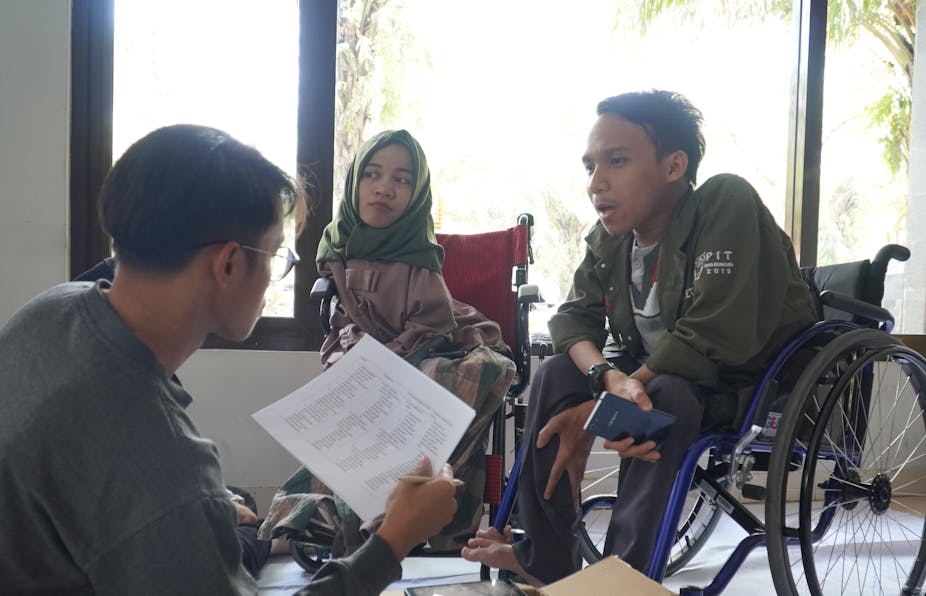To remove the barriers that discriminate against people with disabilities, the Indonesian government should create policies based on high-quality research. People with lived experiences of disability should be at the centre of the research process.
This approach is essential because relevant and accurate data can help overcome the social and cultural prejudices that prevent real action for people with disabilities. And it is critical that research reflects their needs because they understand what is needed.
The majority of research still deals with people with disabilities as objects of research by restricting them to the role of informants.
It is time to start including persons with disabilities as part of the research team. They can then be involved in identifying issues that matter most for their lives in the research design process.
Involving people with disabilities in developing inclusive policy and knowledge of disabilities will greatly help to reduce interest bias and untangle the complexity of disability.
Disability research in Indonesia
Since enacting the Disability Law in 2016, Indonesia has demonstrated its commitment to transforming its approach to upholding the rights of people with disabilities.
It has gradually adopted the social model. This is an approach to social policy-making based on recognising the perspectives of people with disabilities. It emphasises that social structure is the source of exclusion, discrimination and inequality.
Indonesia has since seen emerging research in this area. Since 2015, an international disability conference has been organised biannually by Australian and Indonesian researchers and advocates. The latest one took place in September 2019.
The authors of this article were the conveners of the last conference. Topics discussed at this conference included legal and socio-cultural studies, education, health and well-being, politics, psychology, religion, disability research methodology, infrastructure and technology – tools are being developed to support accessibility.
We see increased interest among researchers at universities, disability advocates working at disabled people’s organisations, and those working with international development agencies on disability research.
Some of the material presented at the conference was the work of people with lived experiences. This academic conference enables us to observe directly the extent of development in disability studies and the level of engagement of people with disabilities, researchers and policy-makers.
Support for research on disabilities has mainly come from international development agencies. The Australian government has been one of the strongest advocates in pushing for inclusive research with a focus on evidence-based research to inform policy.
Under the broad heading of Gender Equity and Social Inclusion, the neighbouring government’s engagement includes a deliberate focus on the quality of life of Indonesians living with disabilities.
Nothing about us, without us
The Latin phrase “nihil de nobis, sine nobis” (nothing about us, without us) communicates the idea that no policy should be decided about a community without direct participation of community members affected by that policy.
Research conducted by people with lived experiences or that involves people with disabilities is consistent with the principle of participatory research. It’s an approach that has been developed in countries like Australia.
However, this approach faces challenges in Indonesia.
First, there is a need for greater adoption of, and funding support for, participatory research to ensure inclusion in research. Secondly, very few people with disabilities have access to tertiary education, but their presence is important to inform this change process to put lived experiences at the centre of research.
It is fair and equitable to expect people with disabilities have an opportunity to contribute. However, they are seriously underrepresented in the sector.
What can be done
Research on disabilities produced in the global north should inform the development of disability studies in Indonesia.
In countries like Australia and United Kingdom, persons with disabilities have been doing research and published findings and recommendations. Their work has contributed to the formulation of socially inclusive policies.
Indonesia should be in a position to not just adopt this work, but gradually formulate relevant local research. This will help expand the emerging research from the global south.
Progress to date includes the establishment of centres for disability studies and services at Lambung Mangkurat University in South Kalimantan; University of Indonesia Airlangga University UNESA and Brawijaya University in East Java; Ahmad Dahlan University, Muhammadiyah Yogyakarta University, Sanata Dharma University and State Islamic University (UIN) Yogyakarta in Yogyakarta; and UIN Jakarta.
Indonesian disability international journals have been published at Brawijaya University and UIN Yogyakarta.
With its robust disability movement and emerging research by disability advocates, Indonesia should be able to form a basis for local knowledge production.
Moreover, local higher education institutions should now do all they can to improve access to education opportunities. This needs to be across the board and not just through specialist disability-focused programs.
Three is no reason people with disabilities should not contribute in all disciplines and become part of the wider community of scholars. That way, all sectors will be strengthened by their insights, and social transformation will become a reality.

